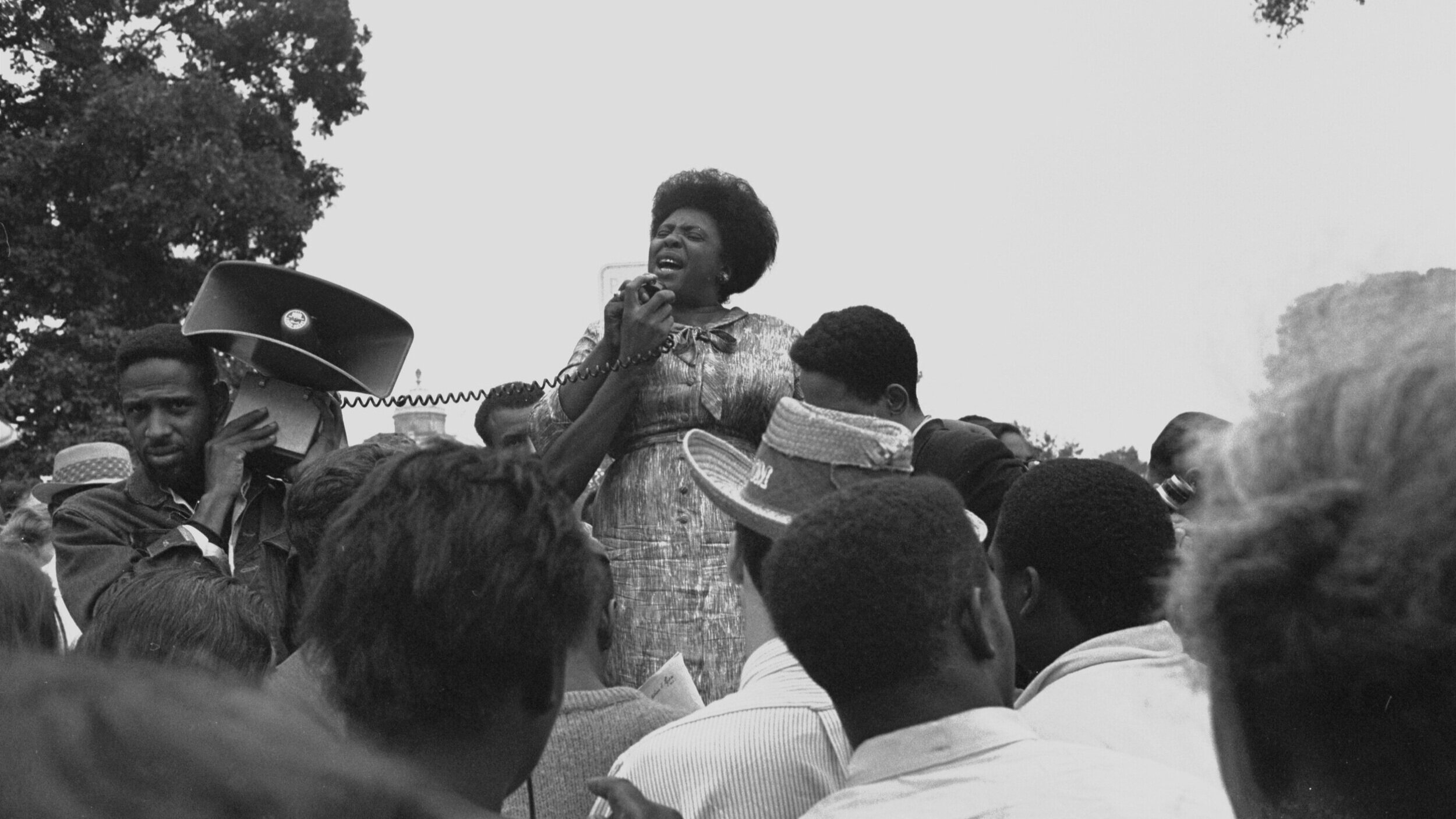
Testimony Before the Credentials Committee (1964)
A speech delivered by Fannie Lou Hamer at the DNC credentials committee rally on 1964.
EDWIN NEWMAN: The Credentials Committee of the Democratic National Convention has now begun to deal with the case of the Mississippi rival delegations, each of which is seeking to be seated as the delegation from Mississippi at the convention. The first delegation to be heard is the Mississippi Freedom Party delegation. That is the largely negro group which insists that it should be seated because the regular Mississippi Democrats are not in fact Democrats at all and would not support the ticket in November.
Joseph Rauh, who is a Washington, D.C. attorney, is presenting the case for the Freedom Democratic Party, and he is calling a succession of witnesses, among whom are Aaron Henry, a druggist in Clarksdale, Mississippi, chairman of the Freedom Party, and also president of the NAACP in Mississippi, and he is speaking now. He is to be followed by perhaps four or five other witnesses, among them perhaps Martin Luther King.
JOSEPH RAUH, Attorney for Mississippi Freedom Democratic Party: Your honor, I must respectfully disagree.
It is the very terror that these people are living through that is the reason that negroes aren’t voting, that they’re kept out of the Democratic Party by the terror of the regular party.
And what I want the Credential Committee to hear is the terror which the regular party uses on the people of Mississippi, which is what Reverend King was explaining, which is what Aaron Henry was explaining, and which is what the next witness will explain, Mrs. Fannie Lou Hamer.
Fannie Lou Hamer begins
Mr. Chairman, and to the Credentials Committee, my name is Mrs. Fannie Lou Hamer, and I live at 626 East Lafayette Street, Ruleville, Mississippi, Sunflower County, the home of Senator James O. Eastland, and Senator Stennis.
It was the 31st of August in 1962 that eighteen of us traveled twenty-six miles to the county courthouse in Indianola to try to register to become first-class citizens.
We was met in Indianola by policemen, Highway Patrolmen, and they only allowed two of us in to take the literacy test at the time. After we had taken this test and started back to Ruleville, we was held up by the City Police and the State Highway Patrolmen and carried back to Indianola where the bus driver was charged that day with driving a bus the wrong color.
After we paid the fine among us, we continued on to Ruleville, and Reverend Jeff Sunny carried me four miles in the rural area where I had worked as a timekeeper and sharecropper for eighteen years. I was met there by my children, who told me that the plantation owner was angry because I had gone down to try to register.
After they told me, my husband came, and said the plantation owner was raising Cain because I had tried to register. Before he quit talking the plantation owner came and said, "Fannie Lou, do you know - did Pap tell you what I said?"
And I said, "Yes, sir."
He said, "Well I mean that." He said, "If you don't go down and withdraw your registration, you will have to leave." Said, "Then if you go down and withdraw," said, "you still might have to go because we are not ready for that in Mississippi."
And I addressed him and told him and said, "I didn't try to register for you. I tried to register for myself."
I had to leave that same night.
On the 10th of September 1962, sixteen bullets was fired into the home of Mr. and Mrs. Robert Tucker for me. That same night two girls were shot in Ruleville, Mississippi. Also Mr. Joe McDonald's house was shot in.
And June the 9th, 1963, I had attended a voter registration workshop; was returning back to Mississippi. Ten of us was traveling by the Continental Trailway bus. When we got to Winona, Mississippi, which is Montgomery County, four of the people got off to use the washroom, and two of the people - to use the restaurant - two of the people wanted to use the washroom.
The four people that had gone in to use the restaurant was ordered out. During this time I was on the bus. But when I looked through the window and saw they had rushed out I got off of the bus to see what had happened. And one of the ladies said, "It was a State Highway Patrolman and a Chief of Police ordered us out."
I got back on the bus and one of the persons had used the washroom got back on the bus, too.
As soon as I was seated on the bus, I saw when they began to get the five people in a highway patrolman's car. I stepped off of the bus to see what was happening and somebody screamed from the car that the five workers was in and said, "Get that one there." When I went to get in the car, when the man told me I was under arrest, he kicked me.
I was carried to the county jail and put in the booking room. They left some of the people in the booking room and began to place us in cells. I was placed in a cell with a young woman called Miss Ivesta Simpson. After I was placed in the cell I began to hear sounds of licks and screams, I could hear the sounds of licks and horrible screams. And I could hear somebody say, "Can you say, 'yes, sir,' nigger? Can you say 'yes, sir'?"
And they would say other horrible names.
She would say, "Yes, I can say 'yes, sir.'"
"So, well, say it."
She said, "I don't know you well enough."
They beat her, I don't know how long. And after a while she began to pray, and asked God to have mercy on those people.
And it wasn't too long before three white men came to my cell. One of these men was a State Highway Patrolman and he asked me where I was from. I told him Ruleville and he said, "We are going to check this."
They left my cell and it wasn't too long before they came back. He said, "You are from Ruleville all right," and he used a curse word. And he said, "We are going to make you wish you was dead."
I was carried out of that cell into another cell where they had two Negro prisoners. The State Highway Patrolmen ordered the first Negro to take the blackjack.
The first Negro prisoner ordered me, by orders from the State Highway Patrolman, for me to lay down on a bunk bed on my face.
I laid on my face and the first Negro began to beat. I was beat by the first Negro until he was exhausted. I was holding my hands behind me at that time on my left side, because I suffered from polio when I was six years old.
After the first Negro had beat until he was exhausted, the State Highway Patrolman ordered the second Negro to take the blackjack.
The second Negro began to beat and I began to work my feet, and the State Highway Patrolman ordered the first Negro who had beat me to sit on my feet - to keep me from working my feet. I began to scream and one white man got up and began to beat me in my head and tell me to hush.
One white man - my dress had worked up high - he walked over and pulled my dress - I pulled my dress down and he pulled my dress back up.
I was in jail when Medgar Evers was murdered.
All of this is on account of we want to register, to become first-class citizens. And if the Freedom Democratic Party is not seated now, I question America. Is this America, the land of the free and the home of the brave, where we have to sleep with our telephones off the hooks because our lives be threatened daily, because we want to live as decent human beings, in America?
Thank you.
Fannie Lou Hamer ends speech
EDWIN NEWMAN: You’re hearing the testimony by Mrs. Fannie Lou Hamer, who was a candidate for congresswoman from the second district of Mississippi in the Democratic primary. She lost. She’s here to testify for the Mississippi Freedom Democratic Party. Also on their list of witnesses is a Mrs. Rita Schwerner, widow of one of the three civil rights workers killed in Philadelphia last June. We’ll be resuming our coverage of the Credentials Committee hearing, and also going to the White House, in just a moment, after a station break.
In 1964, with the support of the Mississippi Freedom Democratic Party (MFDP), Hamer ran for Congress. The incumbent was a white man who had been elected to office twelve times. In an interview with the Nation, Hamer said, "I'm showing the people that a Negro can run for office."
The reporter observed: "Her deep, powerful voice shakes the air as she sits on the porch or inside, talking to friends, relatives and neighbors who drop by on the one day each week when she is not campaigning.
Whatever she is talking about soon becomes an impassioned plea for a change in the system that exploits the Delta Negroes. 'All my life I've been sick and tired,' she shakes her head. 'Now I'm sick and tired of being sick and tired.'" (In Struggle: SNCC and the Black Awakening of the 1960s)
Back to Table of contents

